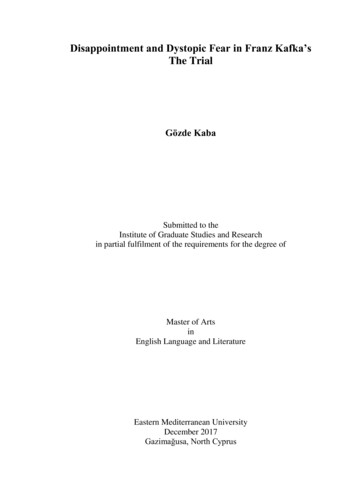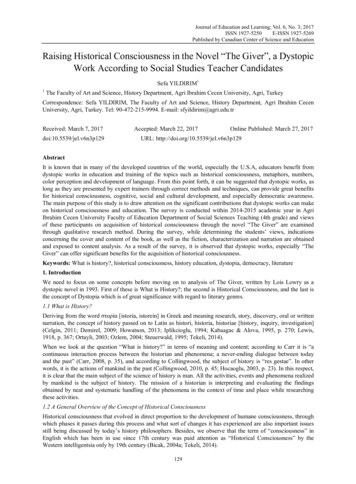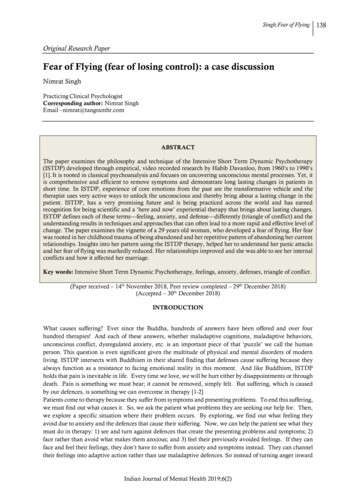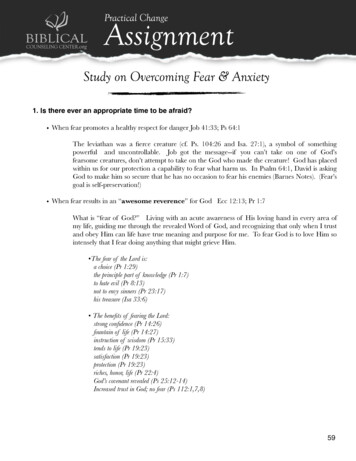
Transcription
Disappointment and Dystopic Fear in Franz Kafka’sThe TrialGözde KabaSubmitted to theInstitute of Graduate Studies and Researchin partial fulfilment of the requirements for the degree ofMaster of ArtsinEnglish Language and LiteratureEastern Mediterranean UniversityDecember 2017Gazimağusa, North Cyprus
Approval of the Institute of Graduate Studies and ResearchAssoc. Prof. Dr. Ali Hakan UlusoyActing DirectorI certify that this thesis satisfies the requirements as a thesis for the degree of Masterof Arts in English Language and Literature.Asst. Prof. Dr. Can A. SancarChair, Department of Translation and InterpretationWe certify that I have read this thesis and that in our opinion it is fully adequate inscope and quality as a thesis for the degree of Master of Arts in English Languageand Literature.Asst. Prof. Dr. Can A. SancarSupervisorExamining Committee1. Asst. Prof. Dr. Can A. Sancar2. Asst. Prof. Dr. Mehmet Zaman3. Dr. Rıza Tuncel
ABSTRACTThis thesis would like to investigate the ways in which Franz Kafka explores thethemes of disappointment and dystopic fear in The Trial. The situations of Kafka‟scharacters have often been compared to the absurd and belittled characters of the postFirst World War era, the inhabitants of the Wasteland, nihilistic Waiting for Godotlike beings who are helpless before the forces of tyranny, and who thereby succumbto despair in the search of justice. We will glance through Kafka‟s The Trial from aLacanian psychoanalytical approach by applying Jacques Lacan‟s Three Orders; TheImaginary, The Symbolic and The Real in understanding the destruction of theindividual. The individual can be destroyed either psychologically or physically orboth in Kafka‟s works, through extreme duress, the compulsion to conform to theexpectation of the System, or murder. This is not self-destruction. It is unwillingvictimhood in Kafka‟s works, although it is often with little will to self-preservationgiven the great power of the „system‟.The modern state, with its sophisticated apparatus of social control can diminish thepower of the individual to the negligible. One of the foremost novelists of the 20thcentury, Franz Kafka became identified with a mood that characterised his work,namely a world portrayed by him as bleak, uncertain, threatening and unreal, withKafka, so much so that the term „Kafkaesque‟ came into use to describe realitywhenever it resembled Kafka‟s fictional world. In the progression of his works webelieve we can see an unfolding philosophy the initial premise in Kafka‟s early workthat the fear of the father is a source of angst and alienation the later works, particularlyThe Trial equate patriarchy with the System with far more unpleasant consequencesiii
as the System has the power not only to oppress, but also to kill. Sense of social missionin the novel reaches its peak in the destruction of Josef K. In conclusion, the thesiswish to establish that in fact The Trial presents a critique of the period in which Kafkawrote that is hopeful and uplifting. By depicting the nightmarish confusion andultimate downfall of his protagonist, Kafka seeks to alert and forearm his readershipin opposition to European totalitarianism, and to celebrate the unconquerable humanspirit.Keywords: Tyranny, justice, disappointment, dystopic fear, the destruction of theindividual, system, Law.iv
ÖZBu tez Franz Kafka‟nın Dava romanında hayal kırıklığı ve olabileceğinin en kötükorku temalarını araştırdığı yöntemleri inceleyecektir. Kafka‟nın karakterlerinindurumları Çorak Ülke‟nin yerlileri, zulüm güçlerinden önceki yardıma muhtaç nihilistGodot’yu Beklerken gibi ve bu sebepten adalet arayışında karamsarlığa yenik düşen I.Dünya Savaşı çağı sonrasının saçma, gülünç ve küçümsenmiş karakterleriylekarşılaştırılmıştır. Kafka‟nın Dava‟sına bireyin yıkımını anlamak için psikanalitikyaklaşımla Jacques Lacan‟nın Üç Kuralı olan Hayali, Sembolik ve Gerçekli‟ğiniuygulayarak göz gezdireceğiz, Kafka‟nın eserlerinde birey ya ruhen ya bedenen ya daher iki şekilde yani son derece baskı yoluyla, sistemin beklentisine uyum isteği ya dacinayetle yok olur. Bu bir kendi kendini yok etme değildir. „Sistemin‟ büyük gücütarafından verilen kendi kendini az da olsa koruma isteğiyle olmasına rağmen,Kafka‟nın eserlerinde bu isteksiz bir kurban olma durumudur.Modern devlet, kendisinin gelişmiş sosyal kontrol aygıtı ile bireyin gücünüyoksanılabilir seviyesinde azaltabilir. 20. Yüzyılın önde gelen romancılarından FranzKafka eserini tanımlayan bir ruh haliyle özdeşleşti, yani başka bir deyişle kendisitarafından kasvetli, belirsiz, şüpheli, endişe verici ve gerçek dışı olarak tasvir edilenbir dünya ile. Eserlerinin ilerleyişinde, baba korkusunun endişe, kaygı, keder veyabancılaşmanın bir kaynağı olan Kafka‟nın ilk eserinde baş terim olarak yayılan birfelsefeyi özellikle ataerkil toplum düzeni sistemle daha fazla hoş olmayan sonuçlarlabirlikte görebileceğimize inanırız. Romandaki sosyal görev algısı Josef K.‟nınyıkımında zirveye ulaşır. Sonuç olarak, bu tez Dava‟nın Kafka‟nın içinde bulunduğuumut dolu ve neşelendirici dönemin eleştirisini sunduğunu ortaya koymayı vev
kanıtlamayı umuyor. Kafka kabus gibi kargaşayı ve başkahramanının nihai çöküşünütasvir ederek okuyucu sayısını Avrupa bütüncüllüğüne karşı önceden hazırlayıp ikazetmeye ve yenilmez insan ruhunu kutlamaya çalışmaktadır.Anahtar Kelimeler: Zulüm, adalet, hayal kırıklığı, olunabilinecek en kötü korku,bireyin yıkımı, sistem, Hukuk.vi
To my beloved son Yiğit Murat Kulvii
ACKNOWLEDGEMENTI would like to thank my parents for their support and motivation. I am grateful to Prof.Dr. Robert D‟alanzo, Prof. Dr. Prakash R. Kona for their advice and encouragementin spite of the physical distance between us. And special thanks to my dear friendsBilun Alioğlu, Robin Davie and Duyal Tüzün for their technical contributions on mythesis.Also I am truly thankful to Asst. Prof. Dr. Mine Sancar for her encouragement andAsst. Prof. Dr. Can A. Sancar, my supervisor, a great mentor for giving me the chanceto write my thesis, his patience, effort and encouragement on creating my ideas whilewriting my thesis.viii
TABLE OF CONTENTSABSTRACT . iiiÖZ .ivDEDICATION . vACKNOWLEDGEMENT. . vi1 INTRODUCTION .11.1 The brief summary of The Trial . 11.2 Franz Kafka . 21.3 The significance of The Trial . 172 BEFORE THE LAW.302.1 Psychoanalytical Approach . 302.1.1 Lacanian Psychoanalysis . 322.2 The beginning of the Fall of K. 422.3 Before The Law – The REAL Trial . 513 CONCLUSION.553.1 K. the Insatiable . 55REFERENCES. 58APPENDIX . 61Appendix A: Kafka‟s Parable, Before the Law . 62ix
Chapter 1INTRODUCTION1.1 A brief summary of The TrialThis seminal work is known as Kafka‟s last and unfinished novel which was writtenin 1915 and published in 1925, a year after his death. Josef K. is a man from anunknown country and also the sole protagonist of the novel who lives alone and ownsthe second highest position in a bank, gets arrested on his thirtieth birthday for anunknown reason. Within a very short time Josef K. finds himself struggling in a casewith an invisible Law and is always followed or surrounded by the unknown peoplewho conform in this unknown organisation.As an ordinary, highly „system‟ adapted obedient citizen of an unidentified country,Josef seeks answers to this bizarre situation in order to find his way out from this deadended labyrinth kind of nightmarish condition which later he finds all his attempts areinconclusive. Every happening is uncertain and leaves Josef disoriented so that soonhe realises that his life has entirely changed. Throughout the story Josef faces hissituation alone. The anonymous but all pervasive bureaucracy hounds Josef K. to hisdeath until his next birthday.Beyond the plot and this protagonist who is an ordinary young man from the middleclass, and seemingly not acting against the „system‟, there lies the political aspect inthe novel which the reader witnesses how Kafka portrays the victimisation of his1
protagonist Josef K. within a different manifestation, indeed absurd way of the„system‟ in the context of the wider society.In this novel we are introduced to a pernicious and dysfunctional bureaucratic systemdestroying Josef‟s individuality, taking his limited freedom away, having him undersuspicion of either criminal proceedings, the nature of which he has not one single clueabout, and causing his tragic death at the end.1.2 Franz KafkaOne of the foremost novelists of the 20th century, Franz Kafka became identified witha mood that characterised his work, namely a world portrayed by him as bleak,uncertain, threatening and unreal, leaving the reader feeling exposed, vulnerable anduneasy at the end of the day. This became a trademark with Kafka, so much so that theterm „Kafkaesque‟ came into use to describe reality whenever it resembled Kafka‟sfictional world. Apart from some of his aphorisms, Kafka‟s literary works arecharacterised by ambivalence and a gloomy atmosphere, and they are characterised byisolated and hapless, belittled protagonists. The very distinctive feature that can be noco-incidence is the constant use of names which reflect the writer‟s own – Josef K., K.in The Castle, Samsa (rhyming with Kafka). This is another sign of his identificationwith his suffering characters. Kafkaesque; “Characteristic of the style, tone andattitudes of the writings of Franz Kafka nightmarish atmosphere which he wascapable of creating through the pervasive menace of sinister, impersonal forces, thefeeling of loss of identity, the evocation of guilt and fear, and the sense of evil thatpermeates the twisted and „absurd‟ logic of ruling powers” (Cuddon, 1992, p.472) inthis work on the illogic and absurdity of oppression.).2
Kafka was born on July 3, 1883 and died of tuberculosis on June 3 in 1924. Born intoa middle class Jewish family that valued education, Franz studied in the AltstädterStaatsgymnasium, a strict high school for the academic elite. Franz‟s forte wasintellectual, and certainly not physical, as we establish elsewhere in this work. In 1901Franz enrolled at the Charles Ferdinand University of Prague where he studied Law,graduating in 1906. This field of study did not seem to interest him much (“. dislikeof the study of law, which he never attempted to conceal.” Brod, 1995, p.41) but itcertainly prepared him for the depiction of legal nightmares in The Trial. After a shortappointment at an Italian insurance company, Kafka joined the Workers' AccidentInsurance Institute for the Kingdom of Bohemia, thus learning all about bureaucraticstructures – also useful for The Trial. At this time in his life, Kafka learned Yiddish,and interested himself in the rise of active Judaism, although he did not become anactivist. Perhaps this is due to the feeling of helplessness that characterise Kafka, andthat is alluded to in the title of this section.Young Franz was never a healthy child, nor was the adult Franz Kafka. As the quoteabove shows, Franz fantasized about being successful like his father, and big and bravelike his father, hence the image of the coach and the heroic rescue of the mistreatedgirl. “According to his mother, he was a weak, delicate child, generally serious achild who read a lot, and didn‟t want to take any exercise ” (Brod, 1995, p.14). So,it seems that Franz, despairing of being like his father outside his dreams, and, if Brodis right about his mother‟s opinion, declining to build his physique through exercise(more helpless behaviour), decided to put his efforts into his writings instead.3
Bad health dogged Franz from an early age, and this had an enormous impact on hiswritings, both in his works and in his private correspondence. He describes himself as“the thinnest person I know” (Parry, 1994, p.xi). His poor health was “an obstacle”throughout his life (Stanch, 2013, p.4). In The Trial, just as when Josef K. needs hiswits about him, he encounters an obstacle in his physical health, and becomes “dizzy”at just the wrong moment – when facing officialdom in an attempt to discover theinstances of his upcoming hearing. He notes that physical distress leaves him “put atthe mercy” of his tormentors (p.53). Perhaps we can see young Franz put at the mercyof his perceived tormentors as a child and young man, and projecting that feeling ontothe character of K.Dying at the most productive age of 41, Franz Kafka left some of his worksuncompleted. His closest companion, Max Brod who was also an author, and who wasan active Zionist went against his friend‟s last wishes, which were that his worksshould not be published, but in fact burned. Incidentally, the Nazis burned his sisters.A man with such a love of knowledge seems odd in this respect.Franz Kafka is synonymous for many with the themes of alienation, high anxiety in acomplex modern world context, powerlessness in the face of faceless bureaucracy,physical vulnerability and absence of hope. He is the great writer on the dilemma ofthe individual and the individual‟s place in a modern society, the quest for freedom(and its frustration), and the Hamlet-like dilemma and mis-match between the life ofthe intellect and action. Here we explore these themes, among others, in The Trial, yetcontend that his world view and intimate personal view do not encompasshopelessness, but rather an audacious sense of hope in spite of all.4
Kafka‟s distinctive style presents his readers with the traumatic sides of his personalpsyche and the reflections of his ethnic roots, as well as his family background, hisrelationship with his father, Hermann Kafka, who is known to posterity by hisauthoritarian and oppressive fatherhood. The looming figure of the father is ofenormous importance to Kafka‟s writings, and part of their darkness. As mentioned,the father is equated with oppression in Franz‟s mind, either directly within the family,or as an ugly aspect of rule of the state through patriarchy. The strongly emotionalengagement with this comes across very clearly in what Franz writes in Letter to myFather. “My writings were about you, in them I merely poured out the lamentations Icould not pour out on your breast” (Brod, 1995, p.25). This could not be clearer – thehaunting effect of Kafka‟s father was both a spur to create and a source of enormousregret. The poignant detail of Franz‟s father‟s breast points to a place where the boycould not find the comfort he craved, where instead he found rejection and pain.Kafka‟s high levels of anxiety have perhaps been exaggerated, but Kafka certainlyfaced “. the anguish of his personal life” (Murray, 2004, p.4). His most famousbiographer and friend (rendering him a primary source), Max Brod sees Kafka in“despair” (Brod, 1995, p.143). The reasons for Kafka‟s anxiety are many. His familylife was difficult, particularly with a domineering and seemingly uncaring father. In aletter to his father, Franz wrote of “the fear I have of you. this fear involves so manydetails that when I am talking I cannot keep half of them together” (Brod, 1995, p.16).The second half of this quote suggests great nervousness in his father‟s presence,rendering his father useless in terms of emotional support. In one of his works TheVerdict, Kafka has a young man driven to suicide by a father who condemns him asan evil character. The sense of victimhood at the hands of the father, and the ineffectual5
presence of the mother in juxtaposition give this work an oedipal character, and aninsight into the angst that Franz inherited from his father in particular, but also fromfamily life in general. The sense of betrayal in this vital parental role is reflected inThe Trial when K‟s in loco parentis, his uncle, says, in the light of the unknownallegations against his nephew “To some extent I am still your guardian, and untiltoday I was proud of that fact” (p.76). Again the fog of uncertainty with “to someextent,” and then the horrible realisation that K.‟s uncle is no longer proud of hisassociation with his nephew – rather that the uncle, like so many, sees Josef as taintedand unworthy - without the slightest clarification of why this should be.The themes of physical frailty, lack of empowerment in society, victimhood and, wecan perhaps say, a deep sense of the ridiculous nature of human existence, cometogether in an abiding image of Kafka‟s – the insect. Of course, this finds its greatestexpression in The Metamorphosis in which an average middle class salesmantransforms into a giant bug and experiences all the humiliations and horrors associated,on the surface, with being an insect, and, on a deeper level, being a human withoutpower, dignity, self-respect or love (“fit for the dustbin” – Parry, 1994, p.vii). Kafkauses the insect image from an early age. In his letters to Felice (with whom he seemsto have been in love), he depicts himself as a helpless insect – an unconventional wayof trying to win a lady‟s heart.Regarding Kafka‟s emotional development in relation to his parentage, Franz spentalmost his whole life in the shadow of a dominant father. Hermann Kafka did hismilitary service for three years, began his first job as a butcher in his father‟s shop, hada very hard childhood, and had to work for long hours for his family in his adult years.6
There is no doubt that Franz Kafka respected his father and envied his strength. AsBrod explains, unfortunately, respect seems to have been one-sided: “All his life Franzwas overshadowed by the figure of his powerful and extraordinarily imposing father –tall, board-shouldered – who, at the end of a life full of work and success inbusiness in whom he took a patriarchal pride [sic] His admiration for his father inthis respect was endless it was fundamental in Franz‟s emotional development”(Brod, 1995, p.5). Due to his father‟s ways they were never be able to construct aloving father-son relationship. This emotional deficit meant young Franz experiencedloneliness and sadness in spite of coming from a large family (he had five siblings inhis early years). “Franz‟s childhood, by all accounts, must have been indescribablylonely governesses and soulless schools. His first memories of erotic awakening areconnected to a French governess or some Frenchwoman. The sadness andawkwardness of his early years – „earth-weight‟ Kafka calls this characteristic ”(Brod, 1995, p.9).The negative impact of the lack of affection from his father was compounded by hismother‟s being very busy with the family business. A diary entry written in 1911 istelling. “I put up with gentle pokes in the back from my mother on our Sunday walks,and with warnings and prophecies which were much too remote for me to be able toconnect them with the sufferings I was then enduring from sadness because, sincethe present was so sad I believed I dare not leave it until it turned into happiness; fromfear, because, afraid as I was of the smallest present step, I considered myselfunworthy responsibility to form an opinion about the great adult future every tinyadvance seemed a fraud I could spend a long time before going to sleep, imaginingmyself one day driving into the ghetto as a rich man in a coach-and-four, and with one7
word rescuing a beautiful girl who was being unjustly beaten, and taking her awaywith me in my carriage; but undisturbed by all this make-believe which probably fedon nothing more than a sexuality which was already unhealthy ” (Brod, 1995, p.11).The inability to connect his “sufferings” with his mother‟s words suggests just thealienation within the family that we see in his later writings; and the impossibility of“the smallest present step” shows his feeling of helplessness in doing anything aboutthis unfortunate situation. The lack of effective family support, and the sadness of lifein general led to a sense of unworthiness – and the psychological ailments werereflected in physical ones.Sexuality is difficult to explore in biography and literary criticism. It is usually aprivate, even taboo, matter, and evidence is, of course, hard to come by. Accounts canbe spurious. Also, Kafka lived long before the sexual liberation of the 1960s, when sexbecame an acceptable topic of polite conversation (Brown, 2000, p.2). Yet Kafka gaveaway a great deal about his sexual nature in his writings. While feeling alienated fromsociety, Kafka desired a conventional bourgeois marriage and a conventional sex life(Parry, 1994, p.xi). He went about it in a strange way, as mentioned above, and, asJames (2007) points out Franz “. never quite got away from the idea that theconsummation of sexual desire, if it should ever happen, would be Schmutz –something dirty” the sense of guilt implicit in a supposedly dirty act finds expressionin both Kafka‟s private life and his writings (Brod, 1995, p.11) describes the youngKafka with “a sexuality that was already unhealthy”; and he also hints at an Oedipuscomplex, with an erotic view of the mother and a subconscious hatred or fear of thefather (Brod, 1995, p.32). With Kafka we can perhaps say that his fear of his father8
was not subconscious, but very overt. We explore this below. With K., sex is a matterof using a poor girl for gratification once a week – no uplifting phenomenon.Reading Kafka in his letters reveals a life in the shadow of such a father. Thus Kafka‟swhole life was blighted, particularly in his romantic relationships, none of which wereto lead to marriage. In Letters to Milena - Milena Jesenska Pollak, Kafka‟s formerlover, writes a letter to her humble friend Haas from a concentration camp saying: “Oh,if only I could be dead without having to die Don‟t let me perish alone like a dog!”(Ed. Haas, 1999, p.11). This makes us turn our attention to World War I rather thanKafka‟s unhealthy romance life. So, can it be a coincidence that this is the fate of JosefK. in The Trial? Dying like a dog? It seems rather to point to K.‟s end foreshadowingthe events of the Nazi era, with Jews and other „racial degenerates‟ de-humanised.Kafka did not write extensively about the socio-political situation of European Jewry,but his novels most certainly depict a futuristic nightmare world in which totalitariansystems served by unaccountable minions tyrannize and oppress, and, indeed, kill thehapless (Roberts, 2004, p.486). While we would not contend that Kafka foresaw theHolocaust, but we can say that he foresaw and understood the historical conditionsunder which such a thing could happen.In a letter to Milena, Kafka answers her question about how it feels to be a Jew inEurope. “ you‟re only asking me if I belong to those anxious Jews furthermore onlypalpable possessions give them the right to live From the most improbable sides Jewsare threatened with danger leave the dangers aside and say they are threatened withthreats” (Ed. Haas, 1999, p.40-41). Anxiety was the lot of Jews in Europe at this time,and this was not only with the rise of the German far right. Already in the Austro-9
Hungarian Empire, Jews were subject to systematized racism, and in most countriesthere was a great deal of anti-semitism. This, of course, reached its apex with the Nazis,yet they exploited a lot of what was already there. Kafka is almost a symbol of thefrightened, cowed Jew. “When you talk about the future, don‟t you sometimes forgetthat I‟m a Jew? It remains dangerous, Jewry ” (Ed. Haas, 1999, p.117).But in Kafka‟s nature there lies fear anyway. In his letters to Milena he frequentlymentions the terrible fear that he cannot dispel; “ my nature is: Fear unfathomableof fear ” (Ed. Haas, 1999, p.57). Kafka writes as if fear was the essence of his being,a feeling that captured his soul and never permitted him to establish his persona. Avast fear eroding his self-confidence, with awful consequence for his life, but alsogenerating a formidable creative output.Marriage was never a serious undertaking for Kafka. This, as we have already argued,seems to have been part of his sense of personal unworthiness and failure. Marriage, ahome, children, responsibility all made him recoil. In one of his letters to Milena, thentwenty-seven, he defines marriage as Katorga, which is a Russian word meaning along term of imprisonment with subsequent exile. “For those who enter into marriageout of despair – what do they gain? If loneliness is joined to loneliness it never leadsto a being-at-hemo but to a Katorga. One loneliness reflects itself in the other, even inthe deepest, darkest night Marriage means rather – if one is to define the conditionsharply and strictly – to be secure” (Ed. Haas, 1999, p.186). “What the threeengagements had in common was that everything was all my fault, quite undoubtedlymy fault” (Haas, 1999, p.43). Due to fear or irresponsibility, Kafka was conscious ofthe damage caused to others as a result of his attitude towards marriage. The word10
“despair” suggests marriage as a refuge, indeed a last resort. The idea of twolonelinesses blended is interesting; Kafka explores the theme of loneliness in TheTrial, with characters occasionally trying to reach out to others only to be rebuffed.K.‟s pathetic need to have his proffered hand shaken springs to mind. The above quotefurther highlights Kafka‟s self-defeating nature; he writes to the woman he (probably)loves, and yet uses the image of a prison to characterise marriage. However, as so oftenwith Kafka, there is ambivalence here. The prison image is very unattractive, but thewords “to be secure” are not – indeed they represent the craving of young Franz tohave the comfort and protection of a functional family life.Felice Bauer met Kafka in Prague in 1912, a result, as so often, of Kafka‟s friendshipwith Brod. As was his habit, Kafka started a prolific correspondence with Felice, andonce again we can see the usual themes. She did not respond very much, and thisdisappointed Kafka; he puts himself down in his recurring ways of self-defeat inrelation to women. He speaks of “prostrating” himself (see below). He dedicated hisshort story, The Verdict (Kafka, 2016, gist) to Felice, a dark tale of a boy oppressedand ultimately drowned by his father. (Drowning can be seen as symbolic ofhelplessness in an alien environment.). Again, the long shadow of Hermann. In spiteof the usual feebleness in the arts of seduction, the couple got engaged in 1914, butthis lasted for only a few weeks. March 25, 1914 - a letter to Felice: (Ed. Heller,Jurgen Born, 1999, p.418-420).It is a telling detail that Kafka feels that he, the great writer and communicator, cannotexpress himself to Felice except when running behind her is a telling detail, as is hisimage of his own self disappearing. The word “humiliated‟ is typical of his self-image,11
and again we have the dehumanising image of the dog – cf Josef K.‟s end and Milena‟s.He states that his disappointments are endless, and that he is immature. Then he makeshis usual expression of desire – a life with Felice – which is undercut by his previouswords. The final assertion that marrying Felice would be an escape from his “deadend” life foreshadows his letter to Milena in which he sees marriage as somethingentered into due to “despair” The two options of marrying Felice or “going away” addsto the sense of wishing to escape – almost a sense of wanting to use her now that hesees his life as coming apart. He later depicts his main protagonist in The Trialconstantly trying to evade threats and embrace opportunities, forge relationships,sometimes being assertive to authority, sometimes kowtowing. His life is a dead end,he has no family life, his sex life is only with a prostitute, and his death is like a dog‟s.There is such a feeling of disappointment, victimhood, scapegoatism and an allpervading haplessness.The result of Franz‟s upbringing was, “ according to the “Letter”, (and in thispassage Kafka provides his own commentary to the conclusion of his novel TheJudgement) “In front of you I lost my self-confidence and exchanged it for an infinitesense of guilt. In recollection of this infinity I once wrote about someone, quite truly,„He is afraid the shame will even live on after him.‟ Kafka goes on to construe his lifeafter this is a series of efforts to break loose from his father‟s sphere, to reach fieldswhere he would be safe from his father‟s influence. That‟s why he wants to lump allhis literary
Young Franz was never a healthy child, nor was the adult Franz Kafka. As the quote above shows, Franz fantasized about being successful like his father, and big and brave like his father, hence the image of the coach and the heroic rescue of the mistreated girl. "According to his mother, he was a weak, delicate child, generally serious a










